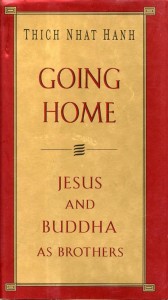
A few weeks back, I took a trip to Nashville to work with a customer of Intellithought. The day was good, much was accomplished and we headed off for dinner. The recommended dining location was a nice cuisine in the newer downtown area. We were early and found ourselves as the only people in the restaurant. We ordered and had small talk until our food arrived. Then, I asked permission to pray over our meal. (This is a practice I have had since childhood and, though I think there is nothing magical about praying before you eat, it has become a good marker in my day to remind me to be thankful.) With a pause of hesitation, my guest let me know it was fine. After the prayer he seemed disturbed. I inquired. He let me know that it was just a bit odd for him to pray in Jesus’ name since he is a Buddhist. This sparked a good conversation.
I shared that, though I am fairly well studied in different sects of Christianity and other major world religions, I am not very familiar with Buddhism. (This is because I have never actually considered Buddhism a religion, but more of an ideology.) At the end of a delightful conversation, He asked me to read the book Going Home: Jesus and Buddha as brothers. He told me that this book had transformed his life and that it would likely bring everything together for me too. I left that night with a new mission. I knew it was quite unlikely that I might embrace Buddhism, but at least I could gain a knowledgable appreciation for the… … … thought system, or religion, or new age practice, or enlightened beliefs or whatever it actually is.
I purchased the book for my Kindle and eagerly began. I quickly learned that water is powerful, waves are water, water is not necessarily wave, wave is one with other waves, waves are sunshine, waves are rain, waves are beaches, waves are clouds, waves are birds, waves are temporal (in and of themselves), waves are eternal (in terms of water), waves are everything, everything is everything, I am waves. At this point, my excitement began to faulter. Though the origins of Buddhism go way back in time, the feeling I got from this book was ominously similar to the feelings I got while reading L. Ron Hubbard’s Dianetics. (Just so you know, these were not feelings of insight and understanding, but more of a feeling that the author needs to be instituted for fear his insanity might spread – which it sadly did.) Though this book was just over 200 pages, it took me weeks to read. I am very big on finishing whatever I start, but this book actually caused me to question whether or not that is a practice which shouldn’t have reasonable exceptions to the ordinarily good and proper rule.
In summary, I hope that this book did not represent Buddhism well because, if it did, I am deeply troubled by either the meaning of enlightenment or my inability to achieve such a state of being.
